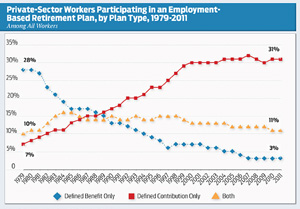
You Don’t Get to Define Your Disability
In 2011, the US Census Bureau reported that about 12 percent of the total population was classified as disabled. More than 50 percent of those


In 2011, the US Census Bureau reported that about 12 percent of the total population was classified as disabled. More than 50 percent of those

“Risk is an arbitrary concept, until you experience it.”—Carl Richards, The Behavior Gap: Simple Ways to Stop Doing Dumb Things With Money Most of the

If you knew you might be starting a business after age 45, how would it affect your saving and retirement planning decisions? To read the

When investors seek financial instruments that promise both a specified rate of return and no loss of principal they are looking for “accumulation insurance.” They

For most of us, accumulating financial assets isn’t an end in itself. Rather, we accumulate assets as a means to realize other material benefits. In

• Life insurance becomes more valuable if bad things happen. • A life-time annuity becomes more valuable if good things happen. As insurance products, life

For all the window dressing the financial-service industry can add to the process, it is possible to distill the essential issues in retirement planning to

A generation ago, a typical retirement discussion usually included a reference to, or illustration of, the “Three-Legged Stool.” This was an analogy to describe the

One of the necessary tasks after the passing of a family member is settling the decedent’s financial affairs. Some of these tasks are mundane, such

Q: Why does the insurance company charge me interest to borrow my own money? This question is one critics of cash-value life insurance often raise.

Probability ≠ (does not equal) Inevitability: The False Premise of Many “Planning” Paradigms The idea that financial success is often achieved by preparing for opportunities

Was Bill Gates well-prepared or just lucky? (Yes.) When it comes to money, did you ever notice how some people seem to be in the